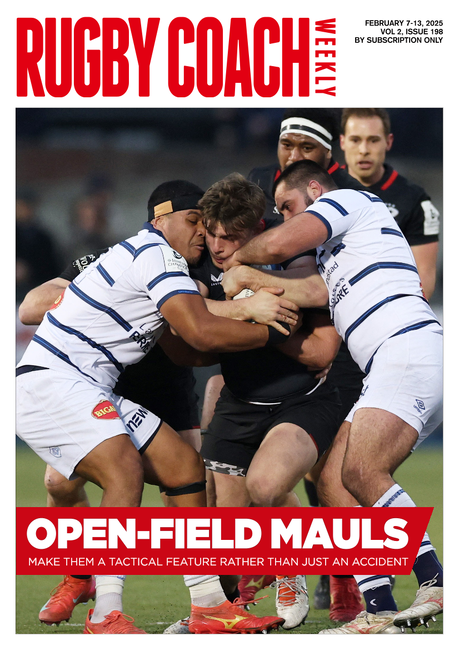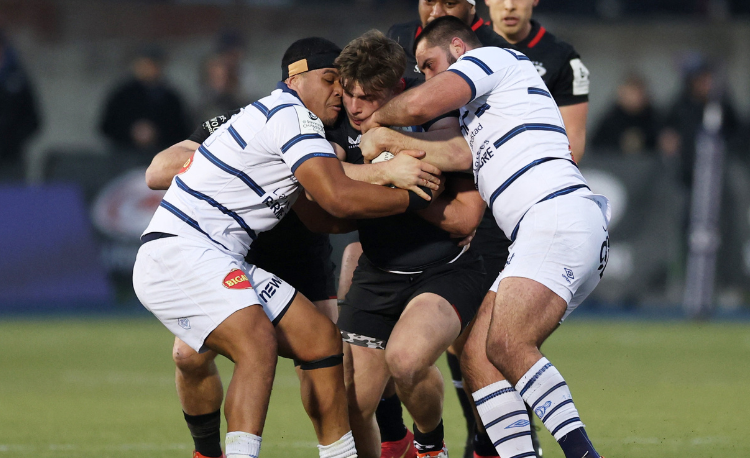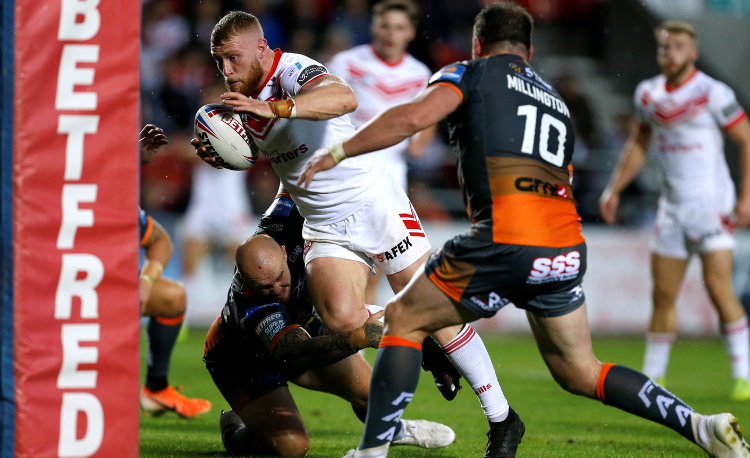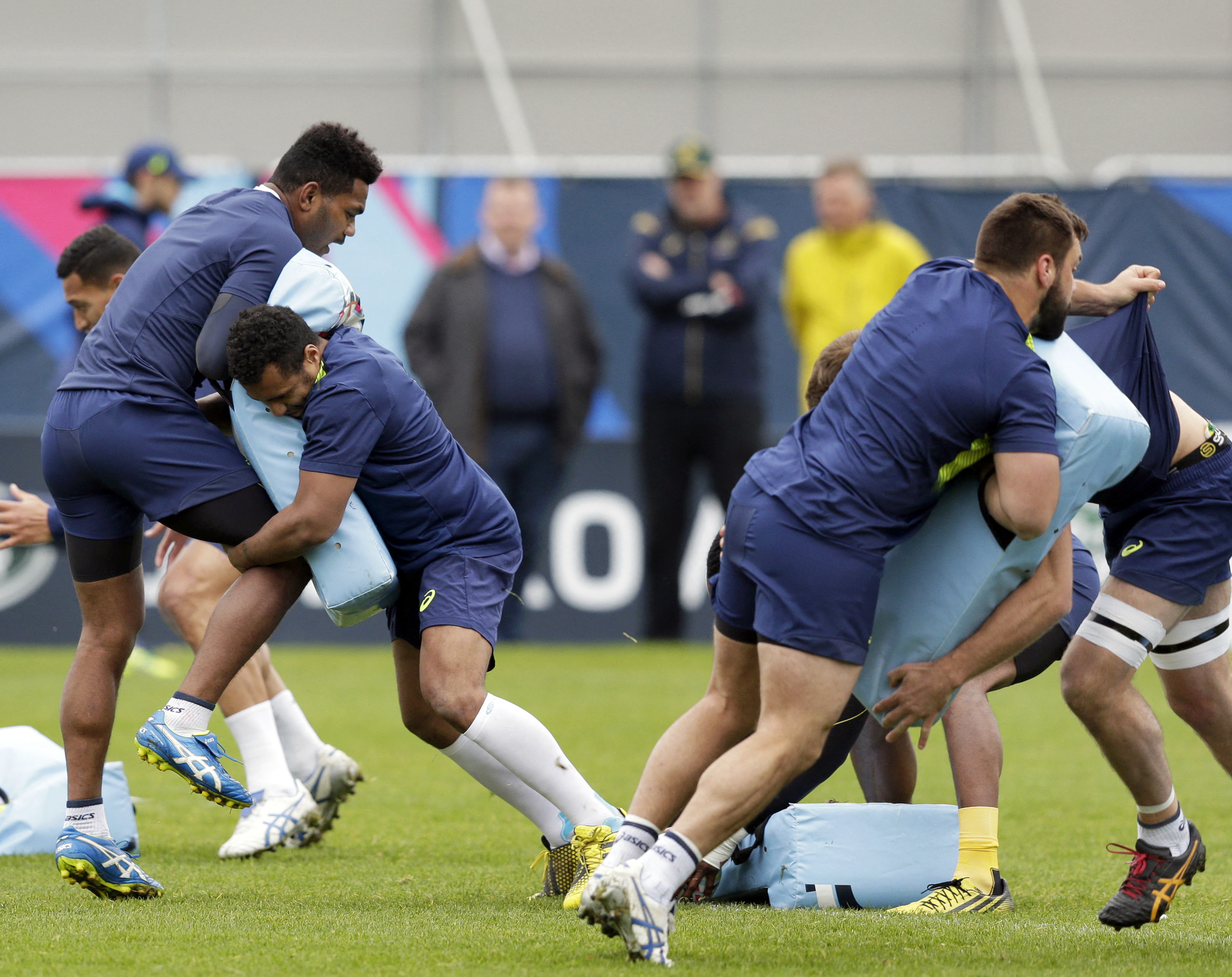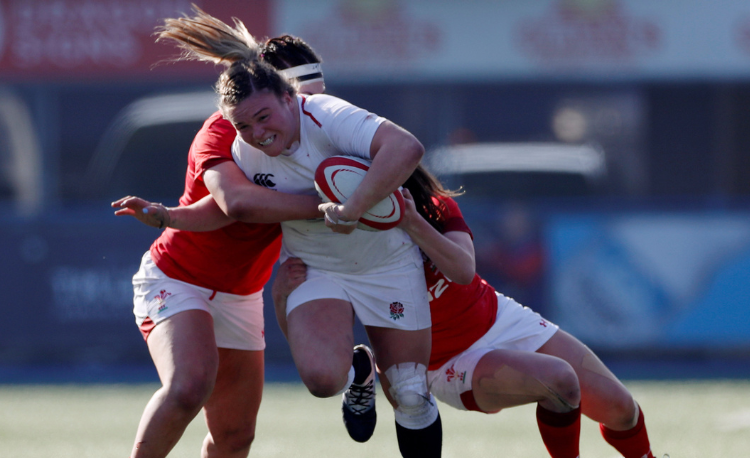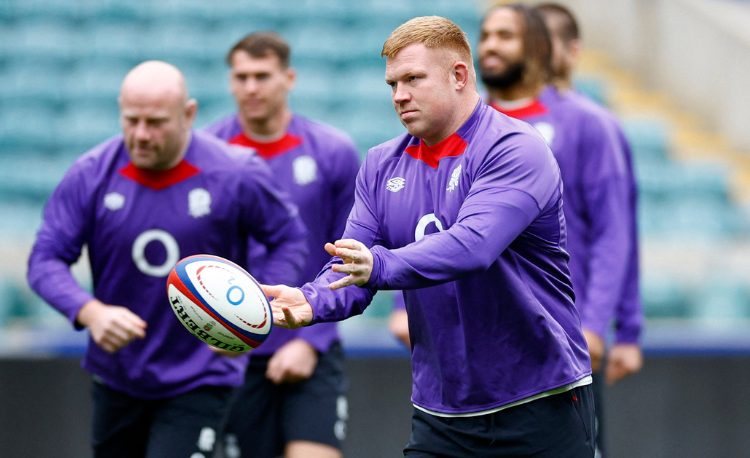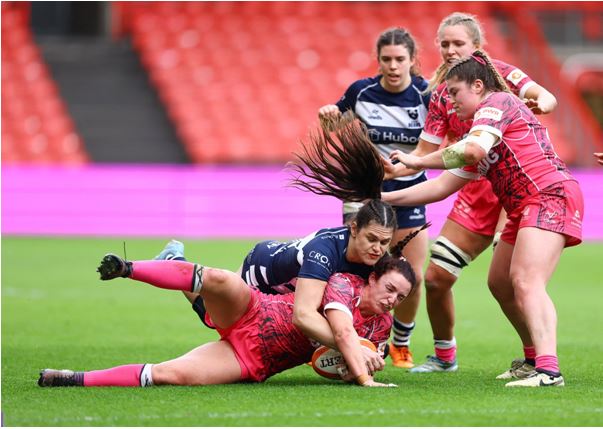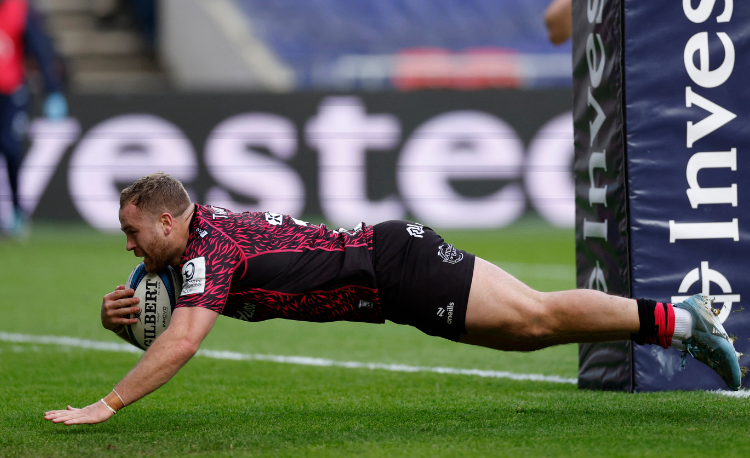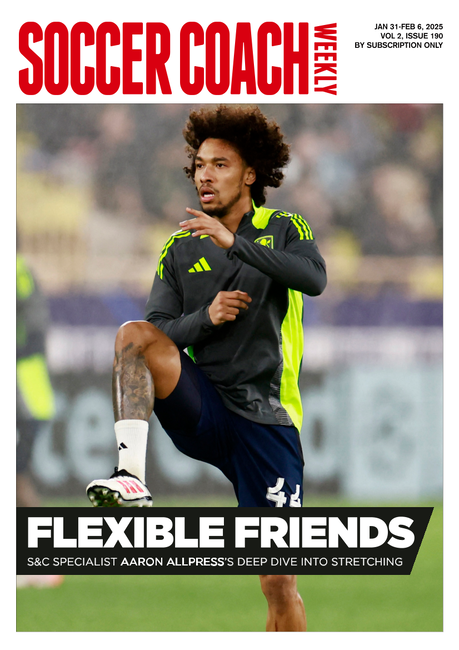Competition winners’ coaching session
Chris Sweetapple won our RCW 10 Year Celebration Competition, which included a coaching session with me. Here’s a report on a wet but enjoyable January morning in North London with the Saracen Amateurs U15B Infidels.
Before the day, Chris sent me an outline of the coaching structure, potential numbers and some of the areas he felt he wanted to address. His side is the B team at U15s though they play other similar standard teams.

In my experience, what seems to pertinent to one coach is not what another coach sees. However, when you're meeting a group for the first time, it’s important to work with the coaching philosophy as to introduce new ideas.
I was at pains to make sure I wouldn’t put in place tactical innovations which went against their current thinking. I also said I would challenge the group to think about new methods. Whether they wanted to adopt them or not was their call. I’m not precious about my coaching ideas being rejected, unless I think their current practices are dangerous.
You can see my sketch plan below. In essence, it’s a series of games. The first few are quite loose and chaotic. I use them to find out more about the characters, where the team is at and where I might have to adjust my session later on.
As the session progresses, I will increase the intensity of contact. It’s fluid enough to drop some of the sections or move one in front of the other. Regular readers of the RCW will recognise many of the methods I used. There’s no formal warm-up. The first game does everything we need.
SESSION PLAN
Because this is an RFU club, I was keen to align the training to the RFU development philosophy of CARDS, which stands for Creativity, Awareness, Resilience, Decision-Making and Self-Organisation. Some of those applied to all the sections, some more than others, and some needed me to make some prompts. I was not explicitly pushing these ideas, just letting them develop within the session.
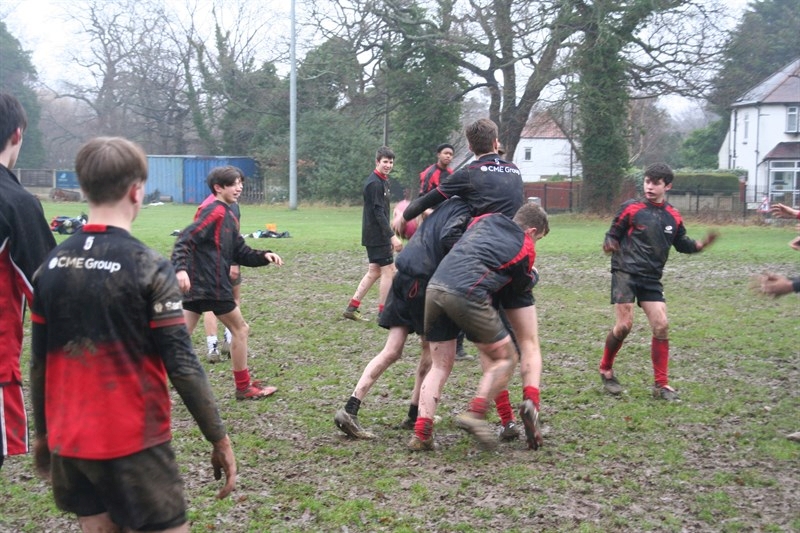
Walking rugby - it's certainly a very high contact game and forced both attack and defence to think differently and be skilful
As you can see from the pictures, it was a pretty wet day, though thankfully not windy. There was a great turnout, especially since it was still the school holidays. Immediately you could tell it was a friendly club. Some players had been playing for years and others who had just taken up the game.
We got going into a game after a quick introduction. I’m not one for long speeches, and I told them I just wanted to challenge them. And they shouldn’t be afraid to make mistakes.
I gave them only a couple of rules, and let them play. If they were touched, they had to pass. There was no limit on the amount of touches they needed. There were more than enough turnovers to mean that most of the time, no team kept possession for long.
While I was thinking I'd use the “food rule” later in the session, because of the conditions, I applied it pretty much immediately.
I also brought in the sin bin rule very quickly. I use it to “punish” players for small indiscretions, like arguing with the referee or, in this case, for giving the opposition the ball after an infringement. In other words, if I did whistle for a turnover of possession, the ball carrier wasn't allowed to hand the ball over to an opponent. He had to put the ball on the ground, and not roll it away. Non-compliance meant the sin bin.
Though this seems unsportsmanlike, it lead to a couple of key outcomes. First, crucially, it meant that he then had to work hard to get back into the defensive line. Second, it produced quite a lot of laughter. The sin bins were only short and the players soon learned to be more careful.
Special power: A player is allowed an advantage, like being able to kick or pass in any direction.
Food rule: If the ball is dropped, the team who dropped it, even if they knocked it on, can retain possession if they pick it up within three seconds.
After about three minutes into the first game I reminded the players I hadn’t said anything about kicking or offside. I did this just by shouting it out in the middle of the action.
Some players wouldn’t have heard this. Either they weren’t tuned in or I hadn’t been clear enough. This was a bit of a risk, but I didn’t want to break up the flow of the game by bringing in the players.
It was interesting that one or two players cottoned onto this idea immediately. Others called “foul”, thinking that the players were committing an offence. When they turned to me, I just repeated that it I hadn’t said it wasn’t allowed.
The next few minutes were pretty chaotic. The wet weather, mud and confusion all mixed together. Earlier I had told the coaching group to try not to say much from the side line. They were quite restrained, so I went over to them to ask to say well done and then ask what they saw. “Chaos and mistakes but smiles and action.”
I was also able to show the coaching group how much I was now not involved in the game. They were refereeing themselves to a greater extent. I was also noted that they were saying far more than I expected. The coaches noted that as well. I didn’t expect this, given most boys of this age tend not to be too vocal.
Generally, unless the player is very confident, I don’t expect them to say much at all. This is the case at this age, where the boys are in a massive transition in their pubescent lives.
One of the boys was keen to improve his team mates, but was tending to be negative in his comments. I could sense he meant to be positive but hadn’t found the best way. I managed to speak to him one-to-one in the flow of the game. I praised his interventions and then asked how he could improve them. I also suggested possible expressions. Here’s a summary of what I said (or he concluded):
> Say the name of the player, so they pay attention.
> Give them something they can do, not something haven’t done.
> Praise them when they’ve done it.
I was using lots of “touch” games. I’m conscious that can mean these skills favour the quicker players. Therefore, some adaptions can suit slower players, especially if there’s more contact.
I experimented with giving the props “turnover rights”. They were given a red headband, so if they made a touch on opposition player, it was an immediate turnover. They could also run for three seconds after a touch, but only pass with one hand.
The outcome was interesting. The smarter players were ordering the props around in attack and defence. That’s not to say that props aren’t smart, but in this case, their special powers were not immediately clear to them.

Players who had a "special power" wore headbands. In this case, front rowers, who won turnovers with their two-hand touch
The initial playing area was becoming boggy, so it was a good moment to move to a larger area. We need to remember the ground staff have a job to do too. Also, rugby needs to be played in small and large spaces because it tests fitness and awareness as well as the regular core skills.
We played various rucking games, where I put an emphasis on ball placement. Now that might seem strange as a focus when you have more space to play in. However, if you want to exploit space, you have to drag in the defence. That sometimes means taking contact. If the defenders have time to realign after the contact/breakdown, they can spread out and cover the space.
If the ball placement is very quick and the subsequent pass is quick too, then the attack can exploit that space. The team had been using long placement (pencil placement). I felt this was slowing down the placement process, so showed them that a jack-knife (L-shaped) placement could be quicker.
I let them experiment with this during the games, though I did say that it was a choice and one they needed to consider.
I must say the nearly two hours flew by for me. That’s what the coaches also said afterwards, and that’s the feedback they got from their players.
I haven’t covered everything I did or said in this report on the day. But, like my intended session outcomes, I wasn’t trying to cover everything in the session. What I wanted was for every player to have thought about something, had a go, made some mistakes and above all, enjoyed being challenged.
Chris and his coaching group should be very proud of what they’ve achieved with this bunch of players. They were well-mannered, hungry to learn, enthusiastic and above all, respectful. It was a delight to coach these groups.
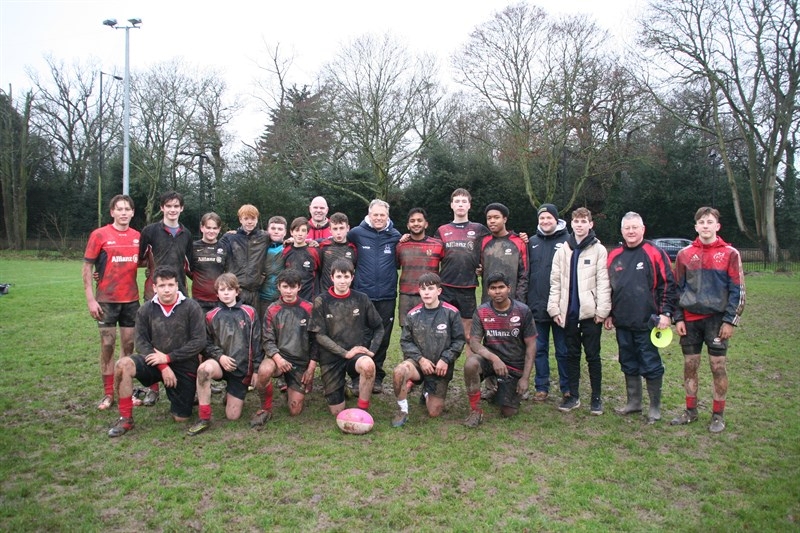
The Infidels after being challenged to play sparkling rugby. They did too. Lots of fun, mistakes and improvements.
Just wanted to let you know that yesterday we rounded off a great week with our best performance of the season. The boys played well and left us all very proud. Several highlights for me, but the big one was at half time. As I arrived at the huddle the noise was immense, everyone saying what we needed to do and who was going to do it. I listened for a few moments then called for quiet and their attention. I told them this discussion was excellent, but what could make it better? One lad replied “one voice”. I shut up and let them get on with it.
Pre-session organisation
Before the day, Chris sent me an outline of the coaching structure, potential numbers and some of the areas he felt he wanted to address. His side is the B team at U15s though they play other similar standard teams.

In my experience, what seems to pertinent to one coach is not what another coach sees. However, when you're meeting a group for the first time, it’s important to work with the coaching philosophy as to introduce new ideas.
I was at pains to make sure I wouldn’t put in place tactical innovations which went against their current thinking. I also said I would challenge the group to think about new methods. Whether they wanted to adopt them or not was their call. I’m not precious about my coaching ideas being rejected, unless I think their current practices are dangerous.
You can see my sketch plan below. In essence, it’s a series of games. The first few are quite loose and chaotic. I use them to find out more about the characters, where the team is at and where I might have to adjust my session later on.
As the session progresses, I will increase the intensity of contact. It’s fluid enough to drop some of the sections or move one in front of the other. Regular readers of the RCW will recognise many of the methods I used. There’s no formal warm-up. The first game does everything we need.
SESSION PLAN
- Touch – pass when touched - kicking allowed - turnover special power – low
number - Atomic touch – secret rule
- Walking rugby – ear tackling – two groups
- Ruck turnover touch – Food rule applies
- Ball touch
- Second man touch
- Full game – special powers/scenarios (1 minute, line, best exit)
- C 1,2,3,6
- A “what can you do differently”
- R 7,6,7,4,3,2,1 “stop losing!”
- D 1 to 7
- S set up the pitches, choose the team
CARDS
Because this is an RFU club, I was keen to align the training to the RFU development philosophy of CARDS, which stands for Creativity, Awareness, Resilience, Decision-Making and Self-Organisation. Some of those applied to all the sections, some more than others, and some needed me to make some prompts. I was not explicitly pushing these ideas, just letting them develop within the session.
It rained!

Walking rugby - it's certainly a very high contact game and forced both attack and defence to think differently and be skilful
As you can see from the pictures, it was a pretty wet day, though thankfully not windy. There was a great turnout, especially since it was still the school holidays. Immediately you could tell it was a friendly club. Some players had been playing for years and others who had just taken up the game.
We got going into a game after a quick introduction. I’m not one for long speeches, and I told them I just wanted to challenge them. And they shouldn’t be afraid to make mistakes.
I gave them only a couple of rules, and let them play. If they were touched, they had to pass. There was no limit on the amount of touches they needed. There were more than enough turnovers to mean that most of the time, no team kept possession for long.
While I was thinking I'd use the “food rule” later in the session, because of the conditions, I applied it pretty much immediately.
Sin bins
I also brought in the sin bin rule very quickly. I use it to “punish” players for small indiscretions, like arguing with the referee or, in this case, for giving the opposition the ball after an infringement. In other words, if I did whistle for a turnover of possession, the ball carrier wasn't allowed to hand the ball over to an opponent. He had to put the ball on the ground, and not roll it away. Non-compliance meant the sin bin.
Though this seems unsportsmanlike, it lead to a couple of key outcomes. First, crucially, it meant that he then had to work hard to get back into the defensive line. Second, it produced quite a lot of laughter. The sin bins were only short and the players soon learned to be more careful.
Terms
Special power: A player is allowed an advantage, like being able to kick or pass in any direction.
Food rule: If the ball is dropped, the team who dropped it, even if they knocked it on, can retain possession if they pick it up within three seconds.
Reacting to the reactions
After about three minutes into the first game I reminded the players I hadn’t said anything about kicking or offside. I did this just by shouting it out in the middle of the action.
Some players wouldn’t have heard this. Either they weren’t tuned in or I hadn’t been clear enough. This was a bit of a risk, but I didn’t want to break up the flow of the game by bringing in the players.
It was interesting that one or two players cottoned onto this idea immediately. Others called “foul”, thinking that the players were committing an offence. When they turned to me, I just repeated that it I hadn’t said it wasn’t allowed.
The next few minutes were pretty chaotic. The wet weather, mud and confusion all mixed together. Earlier I had told the coaching group to try not to say much from the side line. They were quite restrained, so I went over to them to ask to say well done and then ask what they saw. “Chaos and mistakes but smiles and action.”
U15s don’t communicate
I was also able to show the coaching group how much I was now not involved in the game. They were refereeing themselves to a greater extent. I was also noted that they were saying far more than I expected. The coaches noted that as well. I didn’t expect this, given most boys of this age tend not to be too vocal.
Generally, unless the player is very confident, I don’t expect them to say much at all. This is the case at this age, where the boys are in a massive transition in their pubescent lives.
One of the boys was keen to improve his team mates, but was tending to be negative in his comments. I could sense he meant to be positive but hadn’t found the best way. I managed to speak to him one-to-one in the flow of the game. I praised his interventions and then asked how he could improve them. I also suggested possible expressions. Here’s a summary of what I said (or he concluded):
> Say the name of the player, so they pay attention.
> Give them something they can do, not something haven’t done.
> Praise them when they’ve done it.
Slow players need power
I was using lots of “touch” games. I’m conscious that can mean these skills favour the quicker players. Therefore, some adaptions can suit slower players, especially if there’s more contact.
I experimented with giving the props “turnover rights”. They were given a red headband, so if they made a touch on opposition player, it was an immediate turnover. They could also run for three seconds after a touch, but only pass with one hand.
The outcome was interesting. The smarter players were ordering the props around in attack and defence. That’s not to say that props aren’t smart, but in this case, their special powers were not immediately clear to them.

Players who had a "special power" wore headbands. In this case, front rowers, who won turnovers with their two-hand touch
Games and space
The initial playing area was becoming boggy, so it was a good moment to move to a larger area. We need to remember the ground staff have a job to do too. Also, rugby needs to be played in small and large spaces because it tests fitness and awareness as well as the regular core skills.
We played various rucking games, where I put an emphasis on ball placement. Now that might seem strange as a focus when you have more space to play in. However, if you want to exploit space, you have to drag in the defence. That sometimes means taking contact. If the defenders have time to realign after the contact/breakdown, they can spread out and cover the space.
If the ball placement is very quick and the subsequent pass is quick too, then the attack can exploit that space. The team had been using long placement (pencil placement). I felt this was slowing down the placement process, so showed them that a jack-knife (L-shaped) placement could be quicker.
I let them experiment with this during the games, though I did say that it was a choice and one they needed to consider.
Not everything, but something
I must say the nearly two hours flew by for me. That’s what the coaches also said afterwards, and that’s the feedback they got from their players.
I haven’t covered everything I did or said in this report on the day. But, like my intended session outcomes, I wasn’t trying to cover everything in the session. What I wanted was for every player to have thought about something, had a go, made some mistakes and above all, enjoyed being challenged.
Chris and his coaching group should be very proud of what they’ve achieved with this bunch of players. They were well-mannered, hungry to learn, enthusiastic and above all, respectful. It was a delight to coach these groups.

The Infidels after being challenged to play sparkling rugby. They did too. Lots of fun, mistakes and improvements.
Here’s Chris's email a week after the session:
Just wanted to let you know that yesterday we rounded off a great week with our best performance of the season. The boys played well and left us all very proud. Several highlights for me, but the big one was at half time. As I arrived at the huddle the noise was immense, everyone saying what we needed to do and who was going to do it. I listened for a few moments then called for quiet and their attention. I told them this discussion was excellent, but what could make it better? One lad replied “one voice”. I shut up and let them get on with it.
Related Files
Vol-1-Issue-559-D-Cottrell-competition-winners-coaching-session.pdfPDF, 2.1 MB
Newsletter Sign Up
Coaches Testimonials

Gerald Kearney, Downtown Las Vegas Soccer Club

Paul Butler, Florida, USA

Rick Shields, Springboro, USA

Tony Green, Pierrefonds Titans, Quebec, Canada
Subscribe Today
Be a more effective, more successful rugby coach
In a recent survey 89% of subscribers said Rugby Coach Weekly makes them more confident, 91% said Rugby Coach Weekly makes them a more effective coach and 93% said Rugby Coach Weekly makes them more inspired.
Get Weekly Inspiration
All the latest techniques and approaches
Rugby Coach Weekly offers proven and easy to use rugby drills, coaching sessions, practice plans, small-sided games, warm-ups, training tips and advice.
We've been at the cutting edge of rugby coaching since we launched in 2005, creating resources for the grassroots youth coach, following best practice from around the world and insights from the professional game.


